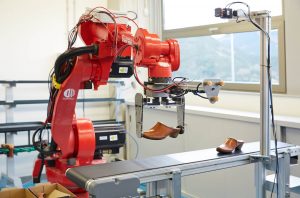
October 7, 2016
Selling Off The Country
By Sharon McElhone
Americans are facing tougher career choices in the era of globalization. Many companies have transferred a lion’s share of American jobs to countries like China, India and Taiwan in order to keep up with demands for inexpensive goods made via cheap labor. Iranian born Melanie K. left the tech world after her job as a buyer/planner for a manufacturing company disappeared and resurfaced in Taiwan. It hurt, but she says she feels lucky that she liked the skin care industry enough to start her own business despite the upset. The new problem is she has concerns that her son, who is in the U.C. system and preparing himself to possibly enter the tech world after he graduates, will find fewer job opportunities. She says she waited her turn in line to become a U.S. citizen, but now the environment has shifted.
Giving work visas to workers from foreign labor markets is going unchecked in America and may even be more detrimental to the American worker than sending their jobs overseas. In this time of increased competition in the global market place, the American government has leaned hard on companies in America to help boost the economy that is also being undermined by the practice of displacing the American worker. Today the U.S. Citizenship and Immigration Services doles out 85,000 H1B visas to American companies in order for them to be able to hire the skilled labor that American companies claim does not exist in the United States anymore. Bias towards foreign workers is flourishing, however, under the current practice with 86% of the H1B visas going to the Indian labor force, according to the Center for Immigration Studies.
The center says “the work-permit is beloved by many U.S. employers who do not want to pay the prevailing wages” for American workers. While the work visa program is proving to be partisan, it may also be creating a hardship for American college students, who are assuming debt from college and need to work after they graduate in order to pay those loans back. It may also be taking its toll on young middle-class families where one or two parents are working and depend on stable hiring practices with American companies to support their families.
 At the same time that a majority of the 85,000 work permit visas are being given out to the Indian labor force, the Mexican labor force has been treated as the scourge of the nation. They struggle to get work permits. Currently, there are rumblings of fixing the labor problem by building a wall with Mexico to keep this labor force from entering our country, which eerily recalls the Berlin Wall and has spawned racial division. When it comes to engaging labor forces, our visa programs and American employers are lifting up certain races and classes over others and the American labor force, which is already multi-national and highly educated, is finding itself out of favor. Have we gone too far?
At the same time that a majority of the 85,000 work permit visas are being given out to the Indian labor force, the Mexican labor force has been treated as the scourge of the nation. They struggle to get work permits. Currently, there are rumblings of fixing the labor problem by building a wall with Mexico to keep this labor force from entering our country, which eerily recalls the Berlin Wall and has spawned racial division. When it comes to engaging labor forces, our visa programs and American employers are lifting up certain races and classes over others and the American labor force, which is already multi-national and highly educated, is finding itself out of favor. Have we gone too far?
In addition, the EB-5 Investor Visa allows an immigrant to obtain a green card with an investment of one million dollars in a city setting and $500,000 in a rural setting. Husband, wife, and all dependents under 21 years of age are entitled to a green card as individual investors. One million dollars and a business guarantees citizenship, which departs from the original vision of the American citizen and American dream.
There is an even bigger threat to American workers–automation. A movement has started within American companies that have a lot to gain financially to automate jobs without the invention of new industries to offset the employment losses caused by automation. In short, we are poised to purge jobs more quickly then we produce them.
The questions about visas and the future of automation need attention and answers. Do we stem or cut the work visas in order to require employers to hire American workers who are already multi-racial and living in this country? Do we recognize the benefit of giving seasonal work visas to migrant workers and finally pull them from the shadows, allowing them to live with dignity and without walls and accept this labor force as a win-win for everyone? Or do we do away with work-visas altogether to allow our own children, who are faced with losing their jobs a fair chance to compete with foreign workers? Do we let automation take over?
 When I look around and hear that companies claim more visas are needed and automation is the wave of the future because we are not preparing our children to compete in the global economy, I’m not buying it. We are losing our sense of patriotism and loyalty and it’s costing us. My parents, who are immigrants and now in their seventies, still work seventy hours a week. My husband and I are college graduates and believe that our children can and will be ready to enter the American labor force.
When I look around and hear that companies claim more visas are needed and automation is the wave of the future because we are not preparing our children to compete in the global economy, I’m not buying it. We are losing our sense of patriotism and loyalty and it’s costing us. My parents, who are immigrants and now in their seventies, still work seventy hours a week. My husband and I are college graduates and believe that our children can and will be ready to enter the American labor force.
Our Indian neighbors both work full time as engineers in high tech, and not only have a strong work ethic themselves, but their children are incredibly hardworking and bright as well. Our children will continue to inspire and to be innovative and creative if we as Americans provide the necessary environment for American workers to thrive. If companies require a different or new set of skills then we need companies to work with our children to make sure those skills are taught.
Side stepping the American worker with the overuse of foreign work visas and not carefully scrutinizing automation are slated to be big concerns in the future. They are a slap in the face to those who have trusted and waited their turn to not only succeed as Americans and to have a better quality of life, but without the flow of money into the economy from a strong middle class as we know and love it, this country cannot function properly. Some American companies will say that the American worker costs them too much. Health insurance, and union negotiations drive them out of business.
Still, there are many American companies who either do not have access to or do not use the work visa program or automation and stay in business. Why? The questions to our labor problems need answers, but we cannot let large companies provide them alone without more checks and balances, without implementing policies that require two unquantifiable things like loyalty and sincerity or without fostering a love of country and of the citizens who contribute to it.
Without loyalty to solving the labor problem in house and finding a way to give our own labor force a chance, we are separating ourselves from countries who are committed to incubating their labor force and providing an environment that will eventually offer the upper hand in terms of global competition. Without sincerity, we cannot build trust and teamwork falters.
The thing about globalization and competing in a global market place is there has to be many countries with strong workforces in place in order to compete with one another, in order to drive strong healthy economies. If we continue to tip the boat and drain other countries of their innovators and give away our own innovations at the same time undercutting our own labor force, we may be attending the funeral of the American worker because, as one gentleman said to me, “we are selling off the country one piece at a time.”
